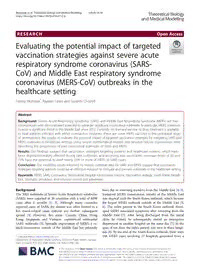
2019 Evaluating the potential impact of targeted vaccination strategies against severe acute respiratory syndrome corona PDF
Preview 2019 Evaluating the potential impact of targeted vaccination strategies against severe acute respiratory syndrome corona
RESEARCH Open Access Evaluating the potential impact of targeted vaccination strategies against severe acute respiratory syndrome coronavirus (SARS- CoV) and Middle East respiratory syndrome coronavirus (MERS-CoV) outbreaks in the healthcare setting Fatima Abdirizak*, Rayleen Lewis and Gerardo Chowell Abstract Background: Severe Acute Respiratory Syndrome (SARS) and Middle East Respiratory Syndrome (MERS) are two coronaviruses with demonstrated potential to generate significant nosocomial outbreaks. In particular, MERS continues to pose a significant threat in the Middle East since 2012. Currently, no licensed vaccine or drug treatment is available to treat patients infected with either coronavirus. However, there are some MERS vaccines in the preclinical stage of development. We sought to evaluate the potential impact of targeted vaccination strategies for mitigating SARS and MERS outbreaks in healthcare settings using simple mathematical models and detailed historic transmission trees describing the progression of past nosocomial outbreaks of SARS and MERS. Results: Our findings suggest that vaccination strategies targeting patients and healthcare workers, which have been disproportionately affected during past outbreaks, and assuming two vaccination coverage levels at 50 and 75% have the potential to avert nearly 50% or more of MERS or SARS cases. Conclusion: Our modeling results informed by historic outbreak data for SARS and MERS suggest that vaccination strategies targeting patients could be an effective measure to mitigate and prevent outbreaks in the healthcare setting. Keywords: MERS, SARS, Coronavirus, Nosocomial, Hospital transmission, Vaccine, Vaccination strategy, South Korea, Middle East, Stochastic simulation, And infection control and prevention Background The 2003 outbreaks of Severe Acute Respiratory syndrome (SARS) were reported in 26 countries with a total of 8098 cases after 6 months [1, 2]. Although many countries reported cases of SARS, the disease was often limited to a few travel-related cases without any further subsequent spread [3]. However, five areas- Canada, China, Hong Kong, Singapore, and Vietnam- experienced substantial SARS outbreaks [3]. Sporadic importation of MERS, a re- lated coronavirus, outside of the Middle East has primarily been due to returning travelers from the Middle East [4, 5]. Sustained MERS transmission outside of the Middle East was atypical until the South Korea outbreak, which became the largest MERS outbreak outside of the Middle East [5, 6]. The index patient in the South Korea outbreak devel- oped MERS associated symptoms after returning from the Middle East [7]. After being discharged from the initial clinic he visited, he subsequently visited an emergency department in another hospital on the same day [7]. In the span of ten days, the index patient was seen in three hospi- tals [8]. By the end of the South Korea outbreak, there were 186 MERS cases involving 17 hospitals generated from a © The Author(s). 2019 Open Access This article is distributed under the terms of the Creative Commons Attribution 4.0 International License (http://creativecommons.org/licenses/by/4.0/), which permits unrestricted use, distribution, and reproduction in any medium, provided you give appropriate credit to the original author(s) and the source, provide a link to the Creative Commons license, and indicate if changes were made. The Creative Commons Public Domain Dedication waiver (http://creativecommons.org/publicdomain/zero/1.0/) applies to the data made available in this article, unless otherwise stated. * Correspondence:
